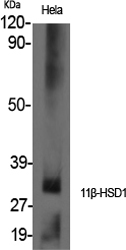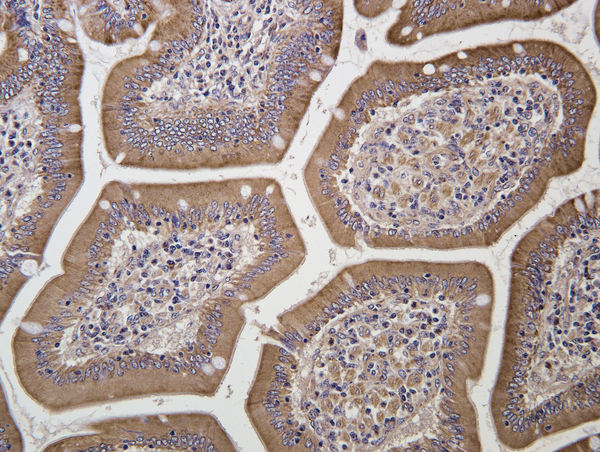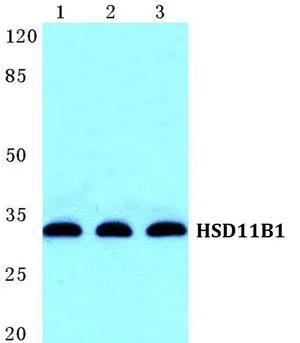
WB analysis of human liver lysate using GTX89627 HSD11B1 antibody, C-term. Dilution : 0.3μg/ml Loading : 35μg protein in RIPA buffer
HSD11B1 antibody, C-term
GTX89627
ApplicationsWestern Blot
Product group Antibodies
ReactivityHuman
TargetHSD11B1
Overview
- SupplierGeneTex
- Product NameHSD11B1 antibody, C-term
- Delivery Days Customer7
- Application Supplier NoteWB: 0.3-1microg/ml. *Optimal dilutions/concentrations should be determined by the researcher.Not tested in other applications.
- ApplicationsWestern Blot
- CertificationResearch Use Only
- ClonalityPolyclonal
- Concentration0.50 mg/ml
- ConjugateUnconjugated
- Gene ID3290
- Target nameHSD11B1
- Target descriptionhydroxysteroid 11-beta dehydrogenase 1
- Target synonyms11-DH, 11-beta-HSD1, CORTRD2, HDL, HSD11, HSD11B, HSD11L, SDR26C1, 11-beta-hydroxysteroid dehydrogenase 1, 7-oxosteroid reductase, corticosteroid 11-beta-dehydrogenase isozyme 1, short chain dehydrogenase/reductase family 26C member 1
- HostGoat
- IsotypeIgG
- Protein IDP28845
- Protein Name11-beta-hydroxysteroid dehydrogenase 1
- Scientific DescriptionThe protein encoded by this gene is a microsomal enzyme that catalyzes the conversion of the stress hormone cortisol to the inactive metabolite cortisone. In addition, the encoded protein can catalyze the reverse reaction, the conversion of cortisone to cortisol. Too much cortisol can lead to central obesity, and a particular variation in this gene has been associated with obesity and insulin resistance in children. Mutations in this gene and H6PD (hexose-6-phosphate dehydrogenase (glucose 1-dehydrogenase)) are the cause of cortisone reductase deficiency. Alternate splicing results in multiple transcript variants encoding the same protein.[provided by RefSeq, May 2011]
- ReactivityHuman
- Storage Instruction-20°C or -80°C,2°C to 8°C
- UNSPSC12352203







